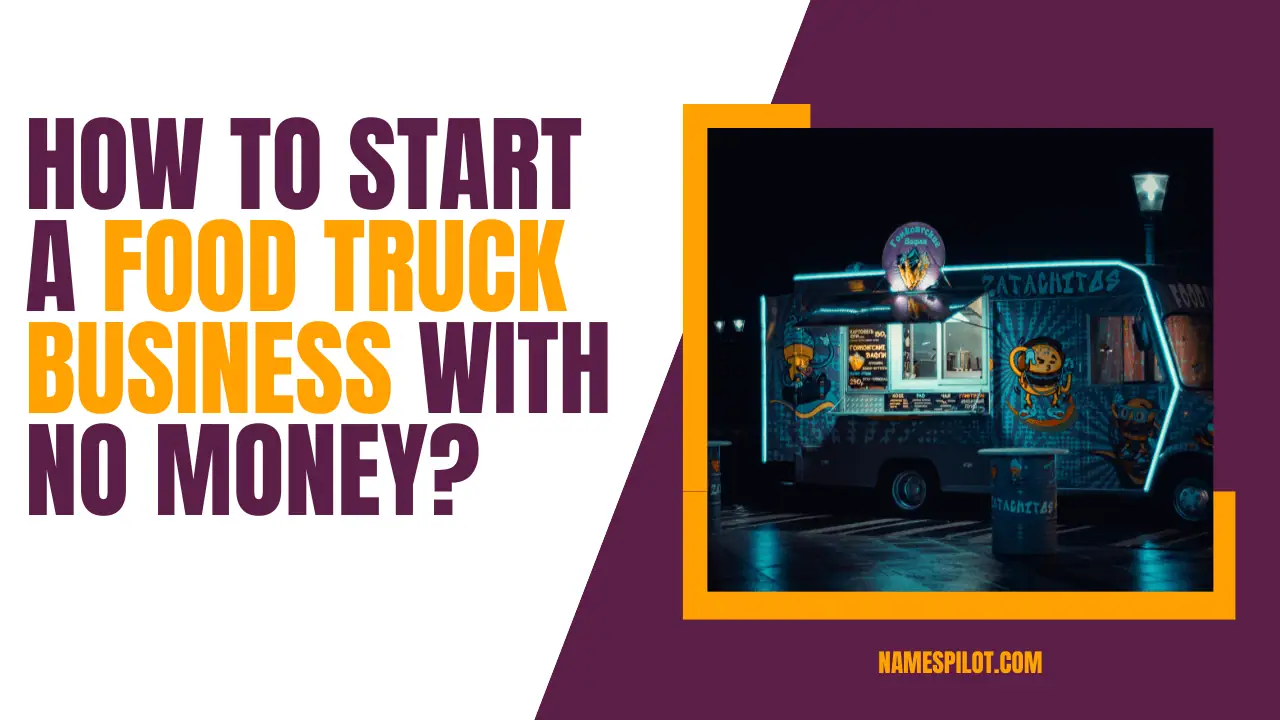Are you dreaming of starting your own food truck business but don’t know where to begin?
The thought of embarking on this journey may feel daunting, especially if money is tight. But don’t let that stop you!
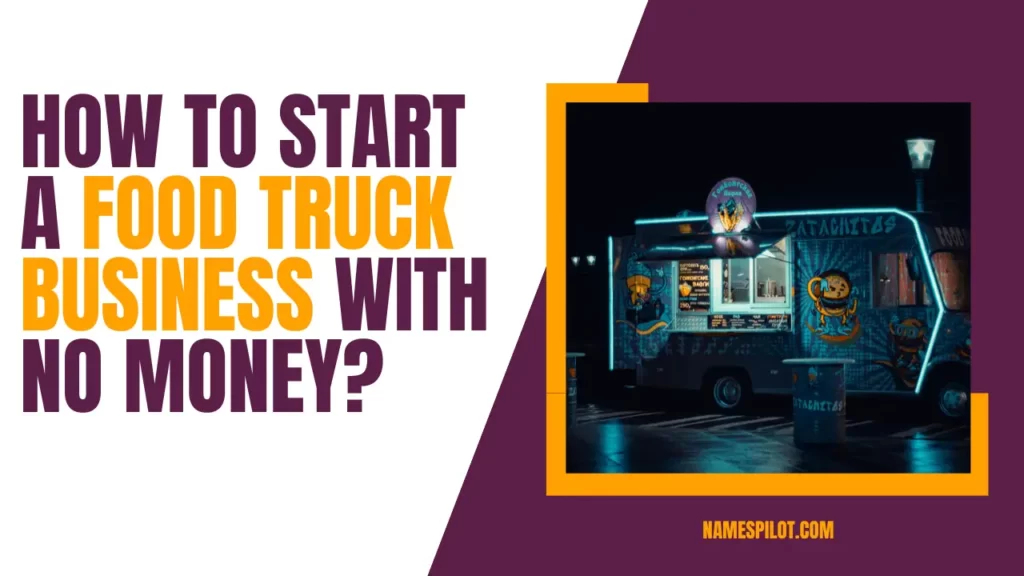
Starting a food truck business with no money isn’t impossible if you have the right strategy and drive.
In this guide, we’ll show you how it can be done!
Develop a Solid Business Plan
The foundation of any successful business is a well-thought-out plan.
Although you may be starting your food truck business with no money, it’s still important to take the time to create a comprehensive business plan that will help guide you through the process.
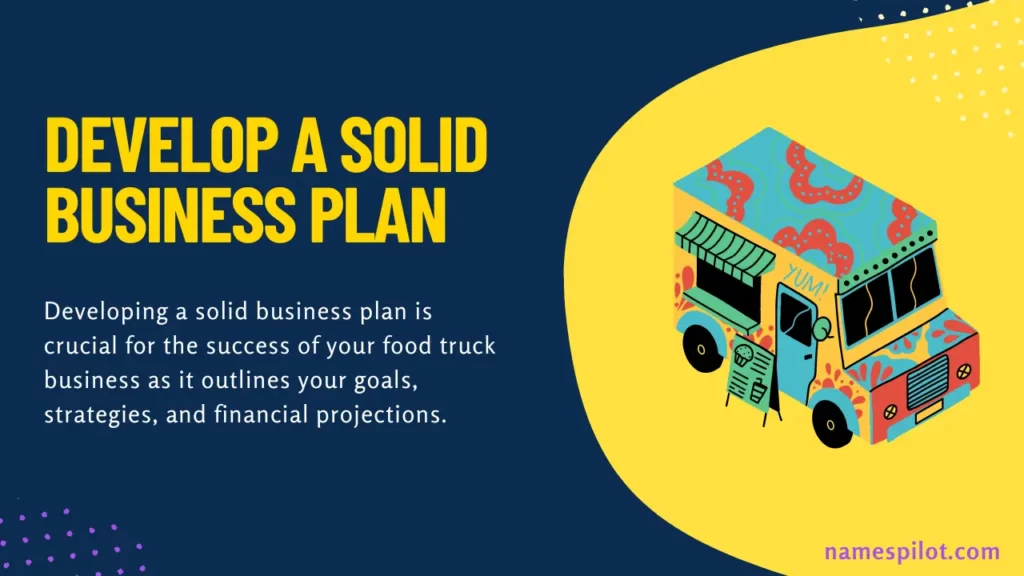
When developing your plan, consider these essential components:
- Business mission statement – Articulate what your primary goal is for launching a food truck business, such as wanting to provide quality dishes at competitive prices or introducing local flavors to neighborhoods near and far.
- Target market – Identify who you think could benefit from your products and services and make sure it aligns with your mission statement. This can include both potential customers (e.g., students in college towns) and possible partners/suppliers (e.g., property owners willing to lease parking space).
- Financing options – Even if you don’t have access to traditional bank financing right now, explore other ways of generating capital like crowdfunding platforms or using resources like Small Business Administration grants specifically tailored for entrepreneurs starting their businesses without any funding.
- Operational costs – Estimate how much overhead would be required each month including everything from rent on facilities used in the preparation of meals through insurance costs related to your vehicle and other equipment.
- Growth strategies – Consider how you will expand your business in the future and make sure it is aligned with your overall objectives. This can include areas like franchising or exploring new technologies to streamline operations, both of which you may be able to implement even when money is tight.
Research Local Regulations and Requirements
Before you start your food truck business, it’s essential to be aware of all the regulations and requirements that must be met to operate legally in your area.
It is important to comply with these laws because failure to do so can lead to hefty fines or even forced closure of operations.
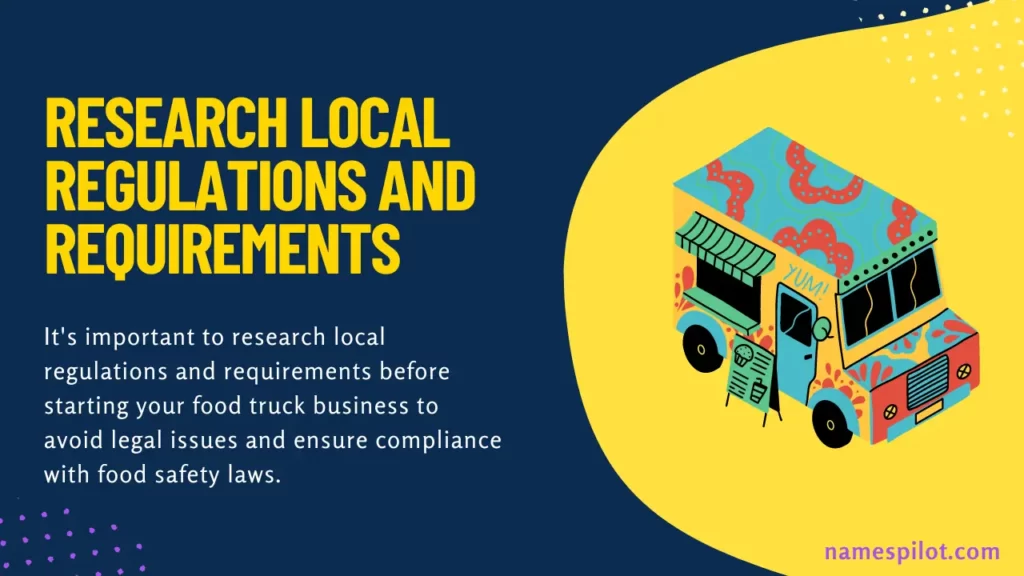
To get started, research any local regulations and requirements related to health inspections, permits, licenses, zoning laws, insurance requirements, and more.
Make sure you are up-to-date on all laws applicable in your region as they may have changed over time.
Vendors must also consider whether their business falls under home occupation ordinances or noise limitations imposed by the city or county in which they plan on operating the food truck.
Moreover, remember that cities often require a special permit for vendors who wish to sell items such as prepared foods at festivals or public events; inquire about such taxes before applying for a vendor license if this applies in your case.
Furthermore, acquire information regarding fees associated with each permit required: some municipalities charge a flat fee while others determine fees based on the gross sales income of the business owner during particular seasonal periods throughout the year.
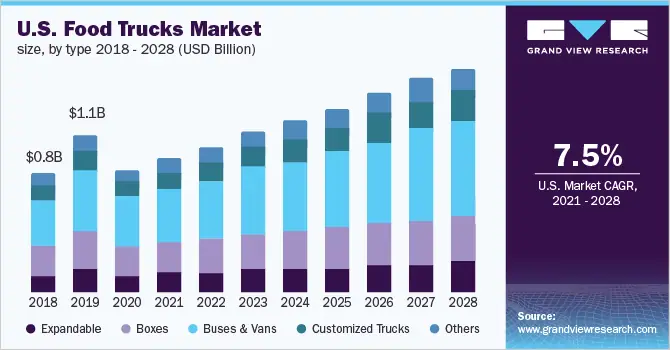
Finally – don’t forget about safety! Food safety regulations and standards vary from state to state, but all vendors must ensure they adhere to the mandated safety guidelines to protect customers.
Be sure that you are following proper hygiene practices, store food in a safe temperature range (between 41°F – 135°F), and clean your equipment regularly.
By researching local regulations and requirements before starting your own food truck business, you can make sure that you’re operating within the law – which is essential for the success of your venture!
Find a Suitable Food Truck
If you’re planning to start a food truck business with no money, finding the right truck is one of your most important steps!
When choosing a food truck, look for size, age, and cost.
Size
The size of your mobile kitchen should accommodate all necessary equipment including prep space, storage units, and sinks.
It should also provide enough room for employees to move around in without feeling cramped.
Consider whether you want an open-air style or a completely enclosed unit depending on what type of cuisine you plan on serving and where.
Age
Try to find a used vehicle that’s well-maintained rather than buying a brand-new one as it may be more expensive upfront.
If costs are tight but still need something reliable think about getting certified pre-owned vehicles instead which come with warranties from their original manufacturer or dealership.
These are usually inspected by mechanics before being sold so you know exactly what condition they’re in when purchasing them.
Cost
Lastly, consider how much money can be allocated towards this purchase if any at all.
Be realistic when budgeting because there may have to be some compromises made when selecting the right truck; working within these constraints will help ensure that everything is feasible financially while still creating an inviting atmosphere for customers.
That being said, don’t be afraid to ask friends and family for help or even look into financing options if possible; it never hurts to explore all avenues when starting a business.
Doing your research ahead of time will make this process much smoother in the long run plus save you money overall.
Did you know?
You can also start your own rental property business with no money!
Don’t believe us, you can check it out here:
👉 How to Start a Rental Property Business With No Money
Source Your Ingredients and Supplies
When starting a food truck business with no money, sourcing your ingredients and supplies is an important step.
Depending on the nature of the cuisine you are selling and whether you plan to cook from scratch or purchase pre-made meals, there are several options available for sourcing your ingredients.
First, consider local suppliers who may offer discounts for bulk purchases. You may even be able to barter services or products in exchange for ingredients, by offering marketing support such as flyers and word-of-mouth promotions in return for discounted prices on supplies.
For example, if you have a network of family-owned bakeries that produce loaves of bread and pastries, inquire about trading marketing work with them in exchange for product discounts.
Second, look into membership programs at national retailers like Costco which can give you access to wholesale prices on staples like oils, condiments, and baking items which will help keep costs down while stocking up your food truck kitchen.
Thirdly investigate buying directly from producers such as farmer’s markets where fresh fruits and vegetables may be purchased at lower costs than those found through traditional outlets like grocery stores or distributors.
This works especially well if you’re cooking dishes that require seasonal produce – this way of getting the freshest fruit or vegetable makes sense financially.
Lastly, consider working with food hubs or aggregators that buy in bulk from local producers and offer discounted prices to their members.
These can be a great way to source fresh ingredients while keeping costs low – plus, you’ll have the added benefit of supporting local farmers! You may also find yourself needing specialty kitchen items such as grills, ovens, refrigerators, etc.
For these larger purchases, it is important to shop around for the best deal available since they are likely going to be more expensive than your ingredients and supplies.
Additionally, look into second-hand stores where lightly used appliances and equipment might cost less than new ones.
Build a Strong Online Presence
Building a strong online presence is an essential part of starting any business, including food trucks.
It’s especially important when you’re building your business with no money as it ensures that potential customers are aware of your existence and can easily find all the information they need about your products and services.
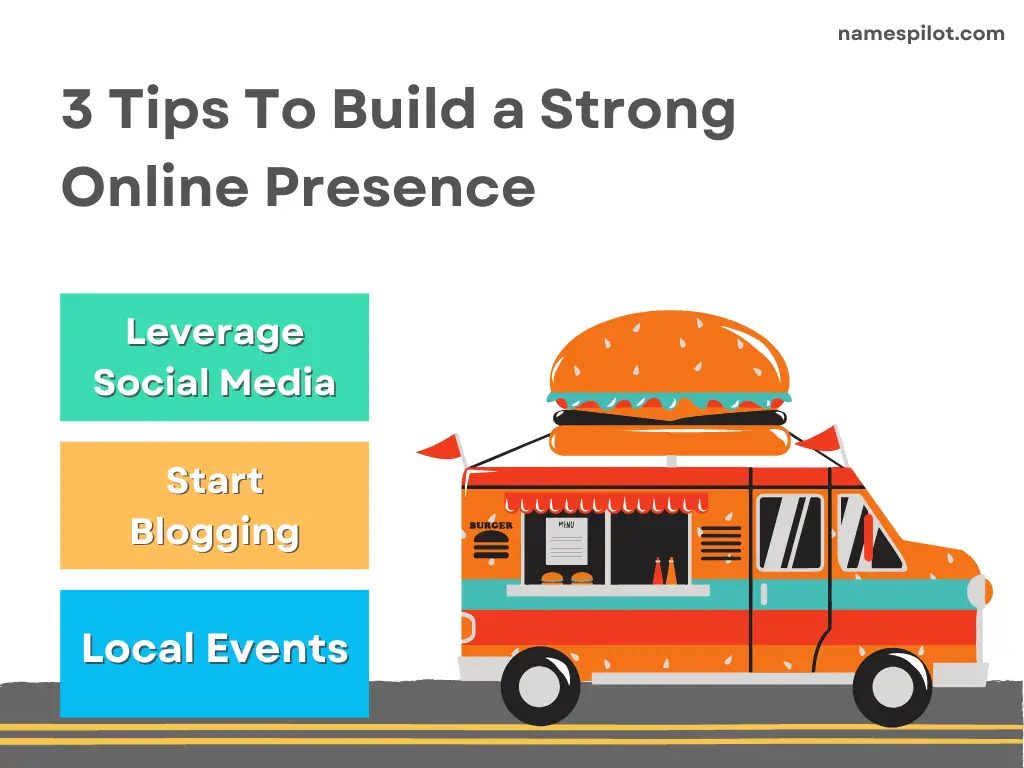
Here are some tips on how to create a strong online presence without spending anything:
Leverage Social Media
Utilize popular social media platforms such as Facebook, Twitter, Instagram, and YouTube to spread awareness about your food truck business.
These platforms allow you to reach more people for free by creating interesting posts and engaging content that will attract potential customers.
Make sure to include links back to your website or blog in every post so users can find out more about what you offer!
Start Blogging
Creating a blog is an effective way to start building an audience for free and establish yourself as an expert in the field of mobile cuisine.
Use this platform to share recipes and other helpful guides related to food truck ownership while showcasing the unique aspects of your operation – this can help draw attention from potential customers who may be interested in trying out something different!
Get Involved With Local Events
Participating in events around your city is a great way to get the word out about your food truck business without relying on spending money.
You can join local festivals, fairs, and other gatherings as a vendor to not only showcase your delicious meals but also meet potential customers who may be interested in what you offer!
Connect With Influencers
Influencers are well-known personalities within their niche that have the power to influence people’s opinions and buying decisions.
Look for local or even national influencers related to food truck businesses and reach out to them via social media or email – this could potentially increase awareness about your own business if they decide to share it with their audience!
Launch Your Business
When starting a food truck business with no money, the key to success is in your launch.
How you launch your business can have a lasting impact on its future trajectory and success.
A successful launch requires careful planning and execution, but if done right it will pay off in the long run.
Importance of a Successful Launch
The importance of having a successful launch cannot be overstated when starting any business, particularly one that involves selling a product or service.
You want people to recognize and trust your brand from day one so they’ll return time and again as loyal customers who recommend you to others.
It’s also important to make sure everything runs smoothly during the initial weeks of operation, including customer service processes, menus, pricing strategies, and more.
Launching successfully means taking into account all these necessary elements before you open for business!
Creating A Launch Plan
No matter how much (or little) money you have available for start-up costs, creating an effective plan is fundamental for launching any new venture, including a food truck business!
Before opening up shop seek out advice from experienced industry pros who can give you guidance on the best practices for launching a food truck business.
Make sure to:
- include your budget (or lack thereof),
- what types of promotions and discounts you’d like to offer,
- how do you plan to market and advertise your truck, and
- any additional elements that might help make your launch successful.
Building Buzz Through Social Media And Other Channels
Getting the word out about your new food truck is an essential part of launching without any money.
Utilizing social media channels such as Facebook, Twitter, and Instagram can be especially helpful when it comes to getting people talking about your brand.
Take advantage of every opportunity to build relationships with potential customers by interacting with them online through posts, likes, comments, or direct messages.
Additionally consider other writing press releases in local publications or distributing flyers within the community; all these marketing strategies are free!
Offering Promotions And Discounts
Promotions and discounts are a great way to encourage potential customers to try out your offerings while helping spread word-of-mouth advertising at no cost.
Come up with creative ideas such as special prices for first-time visitors or competitive deals compared against competitors to generate immediate business upon opening day.
Be sure not to promise, you don’t want people feeling short-changed if they discover the discounts were less than expected, but also keep in mind that offering a deal is often the most effective way to quickly build your customer base.
Managing Your First Few Weeks Of Business
Once you officially launch, it’s important to manage your business with care during its first few weeks of operation.
Get ready for long days and nights as you become accustomed to running things on your own.
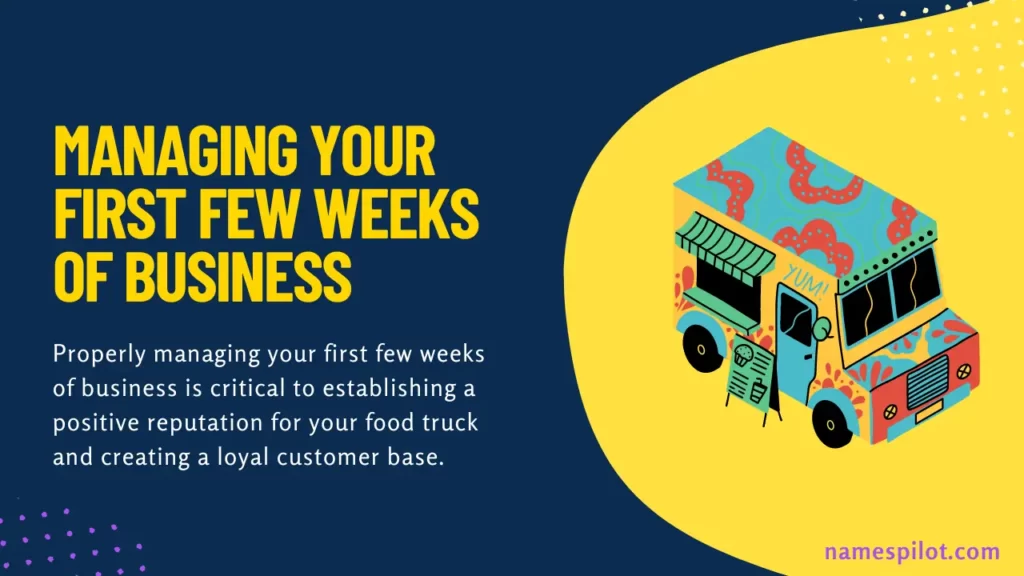
You’ll want to take extra precautions in monitoring daily expenses and handling cash flow correctly until you can establish reliable customers who will provide consistent sales each day or week.
Additionally, be sure not to overwork yourself; make time for breaks so that you can stay focused, alert, and productive throughout this crucial period!
Adjusting Menu And Pricing
Getting the right balance between menu offerings, pricing, and customer satisfaction is an ongoing process when launching a food truck business with no money, so don’t expect to get it right right away!
Be prepared for some trial-and-error during your opening stages as customers let you know what they like (or don’t like) about what they’re eating from your truck.
Take their feedback into account by making adjustments accordingly both in terms of pricing structure and menu items so that people continue coming back for more!
Gathering Customer Feedback
Gathering customer feedback is essential for the success of any business.
This doesn’t have to be limited to just food preferences, ask your customers about their experiences with everything from ordering and payment processes, customer service, pricing, or anything else they might have noticed while eating at your truck.
Be sure to thank them for their honest responses and use this data to refine your operations over time.
Refining Your Operations
As you move forward post-launch, it’s important not to rest on your laurels but instead continue fine-tuning your operations so that you can stay competitive in an ever-evolving market.
Consider new promotional ideas, try out different menu items or pricing structures as per customer demand, and look into ways of expanding your reach through social media campaigns or other marketing tactics.
Make sure every decision you make is deliberate yet flexible enough so that changes can be implemented when necessary!
With these tips in mind, you’re now equipped with all the tools needed for launching a successful food truck business without spending a dime!
Conclusion
Starting a food truck business with no money may seem daunting, but it’s not impossible.
Taking the time to plan and execute your strategy can help you turn your dream into reality.
If you stay focused and don’t give up when times get tough, you’ll eventually be able to run a successful mobile restaurant.
With dedication, hard work, and some outside-the-box thinking, nothing is stopping you from launching that dream food truck business today!
FAQs on How to Start a Food Truck Business With No Money
Is it possible to start a food truck business with no money?
Yes, it is possible to start a food truck business with no money by using creative methods such as crowdfunding, borrowing equipment from friends or family, and starting small.
What are some ways to fund a food truck business with no money?
Some ways to fund a food truck business with no money include crowdfunding, seeking out grants, and finding investors who believe in your concept.
Can I get a loan to start a food truck business with no money?
It may be difficult to get a loan to start a food truck business with no money, but you can try applying for microloans or small business grants that are specifically designed for entrepreneurs who are just starting out.
What types of permits and licenses do I need to start a food truck business?
The permits and licenses needed to start a food truck business vary depending on the state and city in which you plan to operate. Generally, you will need a business license, a food handler’s permit, and a permit from your local health department.
What type of food should I serve in my food truck business?
The type of food you should serve in your food truck business depends on your target market and what type of cuisine is popular in your area. It’s important to do market research and see what types of foods are in demand in your city.
How can I attract customers to my food truck business?
You can attract customers to your food truck business by promoting it on social media, offering discounts or promotions, partnering with local businesses or events, and providing high-quality, unique food that stands out from the competition.
How can I keep my food truck business profitable?
You can keep your food truck business profitable by keeping your costs low, staying organized, offering seasonal specials, and finding ways to increase your revenue, such as catering events or partnering with other businesses. It’s important to keep track of your expenses and adjust your pricing as needed to ensure you are making a profit.
What equipment do I need to start a food truck business?
The equipment you need to start a food truck business includes a food truck or trailer, cooking equipment such as a grill or fryer, refrigeration and storage, and utensils and cookware. It’s important to make a list of all the equipment you need and prioritize your purchases based on your budget.
How can I make my food truck stand out from the competition?
You can make your food truck stand out from the competition by offering unique and creative dishes, having a catchy and memorable name and logo, providing excellent customer service, and using social media and other marketing channels to promote your business.

Rahul is a former medical student turned business blogger who founded NamesPilot to share his passion for entrepreneurship. After successfully launching several online ventures, he now runs his blog full-time, providing tips and insights to help others build their own businesses.

